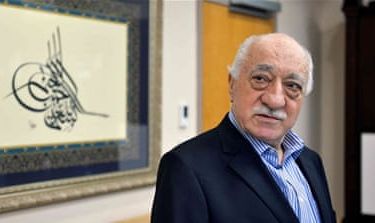US officials to visit Turkey over Gulen extradition request
Turkey says Fethullah Gulen, who has lived in self-imposed exile in the US since 1999, planned the 2016 coup attempt.

Ankara, Turkey – A team of US officials is due to arrive in Ankara on Thursday for a visit that Turkey hopes will pave the way for the extradition of Fethullah Gulen, a former imam it accuses of orchestrating a coup attempt.
Turkey says Gulen, who has lived in self-imposed exile in the US since 1999, masterminded the 2016 attempted coup that led to the deaths of more than 250 people.
Keep reading
list of 4 itemsTurkey captures nephew of US-based preacher Fethullah Gulen
Turkey to detain 82 military officers over alleged Gulen links
Turkish court sentences US consulate employee to jail
Prior to the failed putsch, Gulen’s movement placed supporters within the Turkish state apparatus, particularly the judiciary and police, from where it attacked its opponents, including a 2013 corruption investigation that targeted figures close to then-Prime Minister Recep Tayyip Erdogan.
After the attempted coup, the purge of alleged Gulenists was stepped up, resulting in tens of thousands of people being dismissed from their posts and arrested.
Gulen, who was previously allied to Erdogan, denies involvement in the takeover attempt.
The two-day visit will see the US delegation meet counterparts from Turkey’s justice, interior and foreign ministries to discuss the Turkish case against Gulen, according to Turkish officials.
Turkey has sought Gulen’s arrest since 2014, but efforts to have him returned from the US, where he lives in a sprawling compound in Pennsylvania, have floundered on US claims that Turkey has not provided sufficient proof.
However, a thaw in US-Turkey relations in recent months has raised hopes in Ankara of a breakthrough.
American pastor Andrew Brunson was released from Turkish custody in October and last month’s announcement of a US withdrawal from Syria eased Turkish concerns over American support for fighters linked to the Kurdistan Workers’ Party (PKK).
“We hope and believe that the US will fulfil the requirements of being a state which has been led by the rule of law and it will extradite the head of this terrorist organisation,” Justice Minister Abdulhamit Gul said on December 30. “God willing, the US will comply with our demand in 2019.”
Last month Foreign Minister Mevlut Cavusoglu said President Donald Trump had told Erdogan that the US was “working on” Gulen’s extradition during a meeting at a G20 summit in Argentina. However, the White House later denied that the conversation amounted to a commitment to extradite the 77-year-old Muslim scholar.
Sinan Ulgen, chairman of the Istanbul-based Centre for Economics and Foreign Policies Studies, said the delegation’s arrival could see progress in the case.
“It’s a good time because we are now in the post-Brunson phase, some of the more major irritants to the relationship have been eliminated and there seems to be a good dialogue between Erdogan and Trump,” he said.
However, any headway would “hinge on whether Turkey will be able to deliver documentation that the US Justice Department will feel comfortable with, in its bid to convince the US courts to proceed with such a demand.”
Ulgen added: “What Trump could do is press the US Justice Department to review and work more collaboratively with the Turkish authorities to build a case. They could work with their Turkish counterparts to prepare a file that would be sufficient for the US courts.”
The US embassy in Ankara confirmed the visit by Justice Department staff but declined to comment on the nature of their planned meetings with Turkish officials.
As well as Turkish efforts to convince the US of Gulen’s involvement in the failed coup – Turkey says it has handed over more than 80 boxes of evidence related to the case – the US authorities have their own concerns about the Gulen movement.
The FBI has investigated whether US taxpayers’ money is being used to benefit the group via dozens of “charter schools” with Gulenist links.
Robert Amsterdam, an international lawyer hired by Turkey, has said the schools gave contracts to Gulen-affiliated companies and teachers were forced to submit some of their government-funded salaries to the movement.
Gulen’s name has also cropped up in the investigation into Russian interference in the 2016 US election. Trump’s former National Security Adviser Michael Flynn was allegedly involved in lobbying for Gulen’s extradition and reportedly plotted to kidnap and fly him to Turkey on a private jet.